
Publications
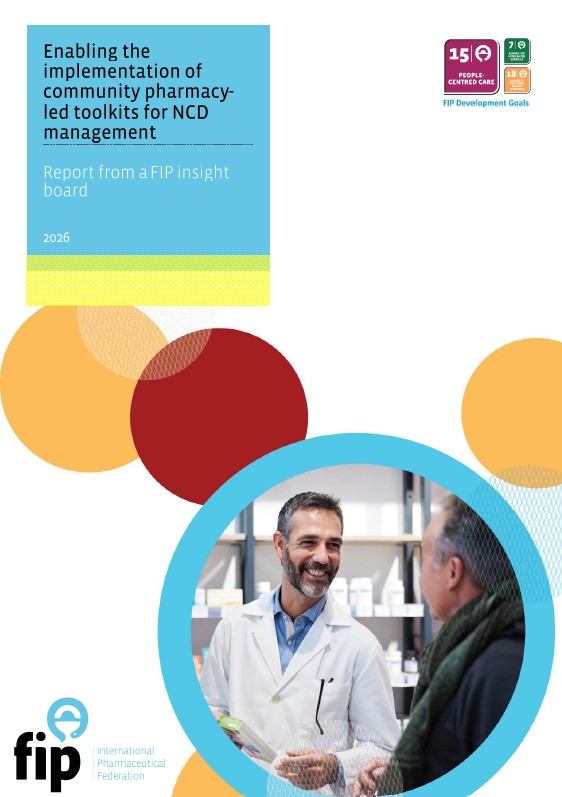
Enabling the implementation of community pharmacy-led toolkits for NCD management. Report from a FIP insight board
This report explores how national policies and health system frameworks can enable the implementation of community pharmacy-led toolkits for non-communicable disease (NCD) management. It identifies key enablers, barriers and policy pathways to support the sustainable integration of structured pharmacy services into primary care, strengthening prevention, early detection and long-term condition management.
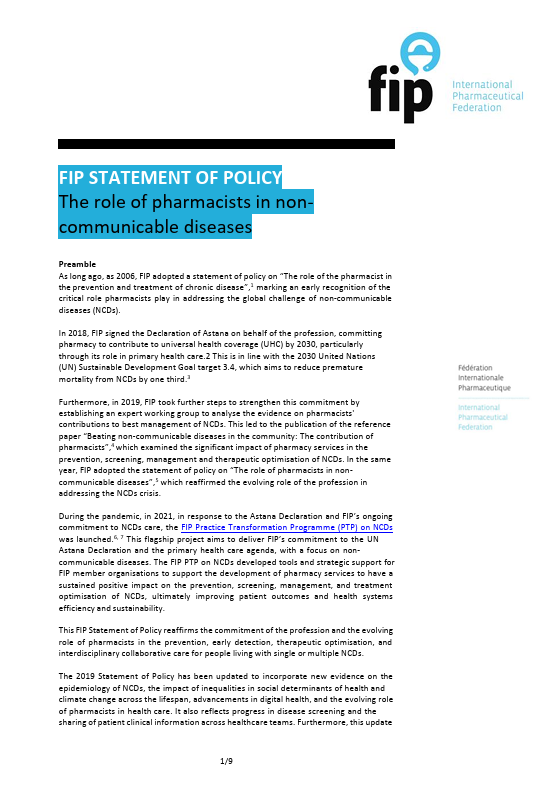
FIP Statement of Policy on the role of pharmacists in non-communicable diseases
2 September 2025Non-communicable diseases (NCDs) remain the world’s leading cause of preventable death, yet pharmacists are still underutilised in tackling this global crisis.
Reaffirming commitments made under the Astana Declaration and the FIP Practice Transformation Programme on NCDs, this updated policy reflects the latest evidence on the global impact of chronic diseases and highlights the vital role pharmacists play in prevention, early detection, treatment optimisation and ongoing care.
The statement outlines how pharmacists support patients at every stage, leading risk-factor screening, providing lifestyle counselling, managing complex medicines regimens, and coordinating care as part of interprofessional teams. In many communities, especially underserved areas, pharmacists are often the first and sometimes only point of care for people living with chronic conditions.
It also highlights the need to tackle social and economic inequalities that contribute to the global NCD burden and calls for better use of digital tools and data-sharing to strengthen prevention, monitoring and treatment.
FIP’s updated recommendations urge governments and policymakers to fully integrate pharmacists into national NCD strategies, expand their scope of practice, ensure fair remuneration for pharmacist-provided services and invest in workforce development to meet rising healthcare demands.
The statement also calls on pharmacy organisations, educators and the pharmaceutical industry to align efforts by developing practice guidelines, promoting evidence-based interventions and fostering research to demonstrate the value of pharmacist-led care.
Through this policy, FIP and its member organisations reaffirm their commitment to the WHO Global Action Plan on NCDs and universal health coverage — working together to reduce the global burden of chronic diseases, improve patient outcomes and strengthen sustainable health systems.
Daragh Connolly and Ema Paulino, Co-Chairs of the FIP Statement of Policy on the role of pharmacists in non-communicable diseases, adopted by the FIP Council on 31 August, briefly present the Statement in this video.
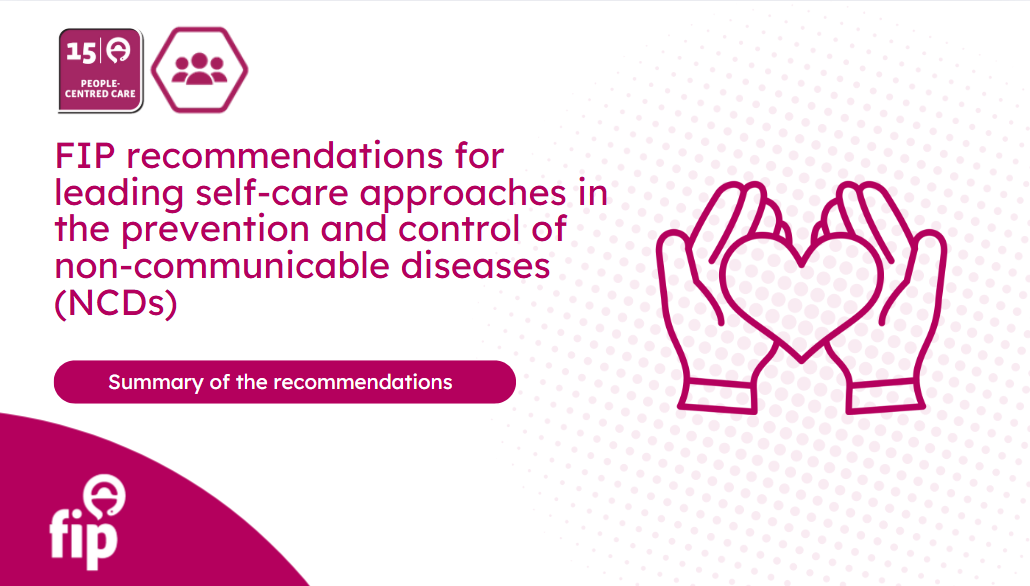
FIP recommendations for leading self-care approaches in the prevention and control of non-communicable diseases (NCDs)
This resource provides evidence-based recommendations for implementing self-care approaches that support the prevention and control of non-communicable diseases (NCDs).

Embracing pharmacists’ roles in health-care delivery
The universal shortage of qualified health workers remains a persistent challenge for health-care systems. As per the WHO European Framework for Action on Health and Care Workforce1 a solution lies in redefining and re-distributing tasks across different health-care providers to keep pace with patient needs, advances in professional education and new technologies.2 In this context, the contribution of pharmacists to achieving health system priorities becomes critical. Pharmacists, particularly those working in community settings, are essential yet often overlooked health professionals who can make a difference in improving healthcare delivery.
Pharmacists contribute to disease prevention, including through vaccination, early detection, symptoms alleviation, and chronic condition management. Pharmacists also play a crucial role in informing and facilitating selfcare, making appropriate referrals, contributing to medication adherence and responsible use of medicines and resources.
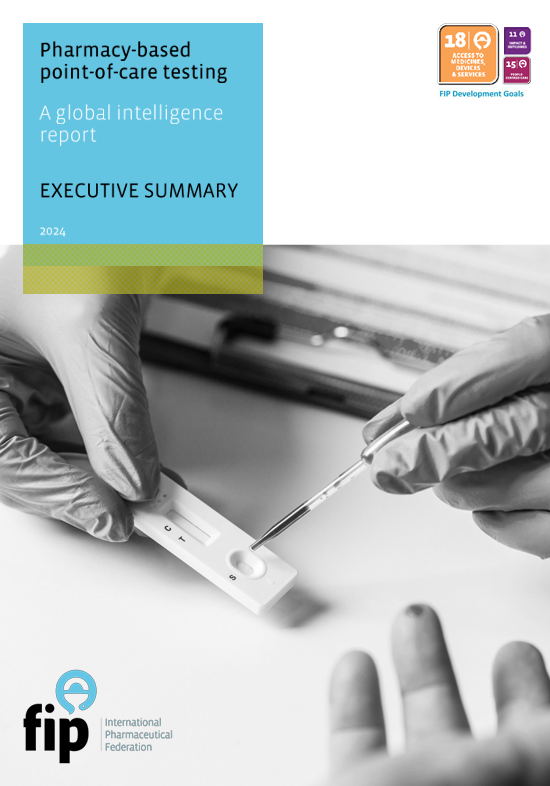
Pharmacy-based point-of-care testing: A global intelligence report - Executive summary (2024)
This publication summarises the “Pharmacy-based point-of-care testing: A global intelligence report”, a report that brings together evidence from a literature review, findings from a survey of 25 countries, 11 case studies, and the discussion of a FIP insight board, giving an overview of pharmacist-led POCT interventions around the world.POCT services, which include a wide range of tests to identify, diagnose, assess and/or monitor indicators of health, are strongly correlated with positive health outcomes. They are also linked to economic savings, increased health system efficiency and reduced burden on other healthcare sectors, the authors say. The report gives examples of POCT services being linked to prescribing authority by pharmacists, contributing to reducing pressure on general practice and emergency departments.
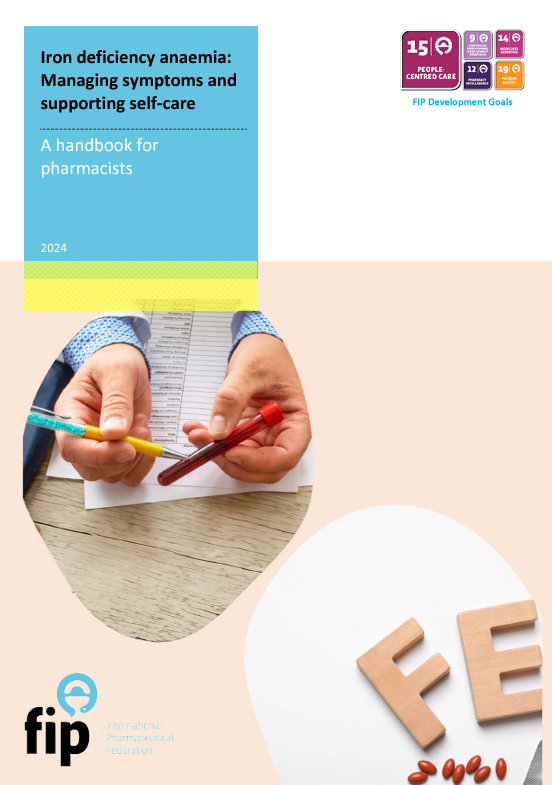
Iron Deficiency Anaemia: Managing symptoms and supporting selfcare. (2024)
This handbook provides pharmacists with the latest insights into iron deficiency anaemia, drawing on collective evidence and recommendations from existing guidelines and expert consensus. It addresses not only pharmacological treatment and non-pharmacological interventions but also prevention strategies. Additionally, the handbook covers guidelines for managing iron deficiency anaemia (IDA) in special populations, including paediatrics, non-pregnant women of reproductive age, pregnant women and breastfeeding mothers, the elderly, patients with chronic diseases, and individuals on strict diets. Overall, this handbook serves as an invaluable resource for pharmacists in managing IDA, underpinning the importance of pharmacists’ role in screening, managing, treating, patient education, and holistic self-care practices.
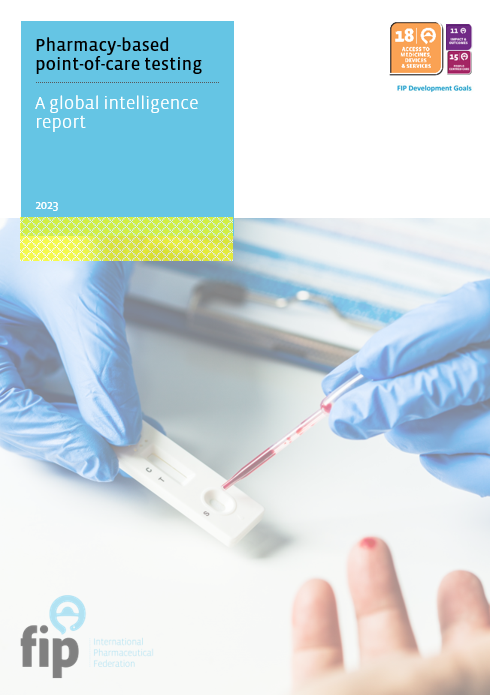
Pharmacy-based point-of-care testing: A global intelligence report. (2023)
“Pharmacy-based point-of-care testing: A global intelligence report” brings together evidence from a literature review, findings from a survey of 25 countries, 11 case studies, and the discussion of a FIP insight board, giving an overview of pharmacist-led POCT interventions around the world. POCT services, which include a wide range of tests to identify, diagnose, assess and/or monitor indicators of health, are strongly correlated with positive health outcomes. They are also linked to economic savings, increased health system efficiency and reduced burden on other healthcare sectors, the authors say. The report gives examples of POCT services being linked to prescribing authority by pharmacists, contributing to reducing pressure on general practice and emergency departments.
This document is available in:
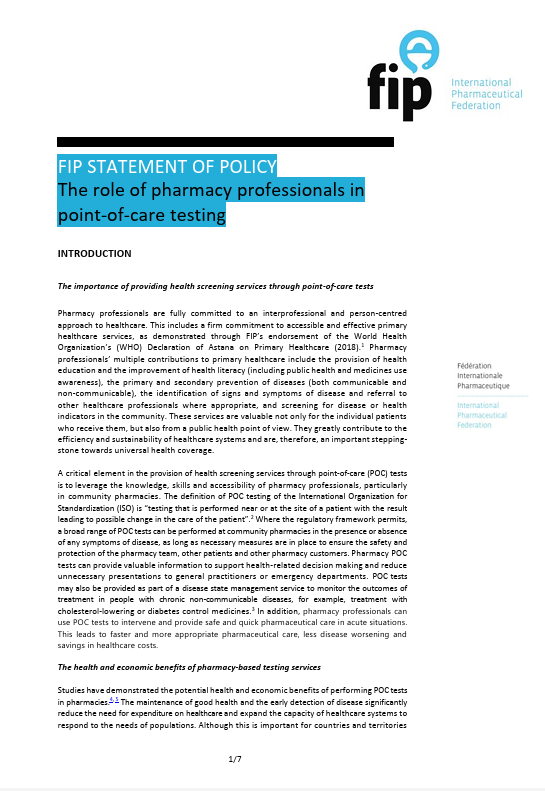
FIP Statement of Policy on the role of pharmacy professionals in point-of-care testing
1 September 2022This FIP Statement of Policy is intended to support governments and policymakers, FIP member organisations, pharmacy academic institutions and individual pharmacy professionals wishing to promote the provision of point-of-care screening and testing services in pharmacies.

Medication review and medicines use review. A toolkit for pharmacists (2022)
This current toolkit is an update to the version of the toolkit on MUR published in December 2020. This new version frames MUR as a subtype of MR, defines each type of professional service and provides guidance on their implementation. Although it could seem that the difference between both services is subtle and mostly terminological, there is a significant conceptual difference between MR — a service where the healthcare team assesses a patient’s current medicines to optimise clinical, humanistic and economic factors—and MUR, where the emphasis is in the word “use”, and where pharmacists interact directly with patients to improve their medicines use, considering their preferences and, ultimately, optimising adherence to treatment.
This document is available in:
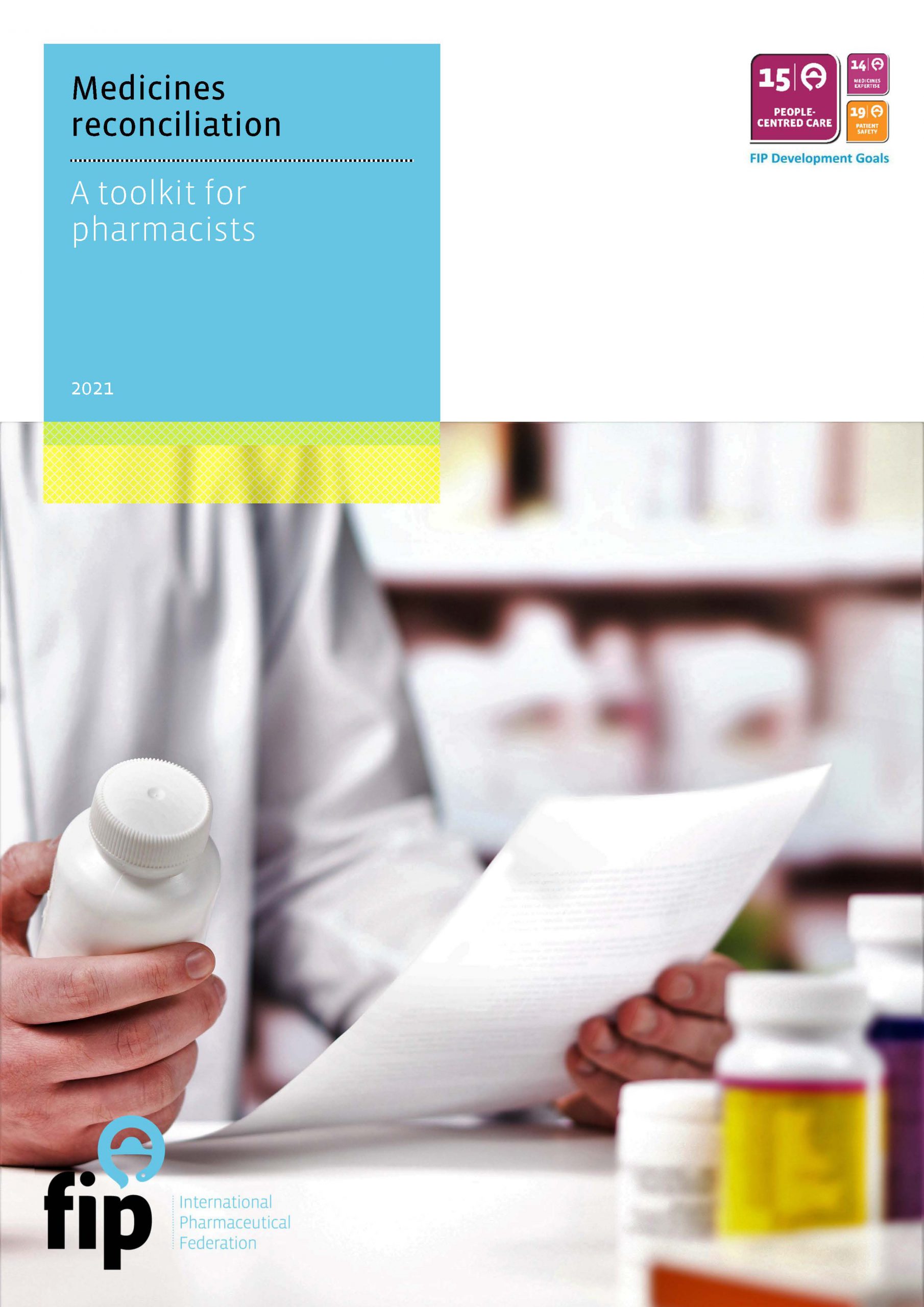
Medicines reconciliation: a toolkit for pharmacists (2021)
This toolkit summarises the definitions, impact, and procedures for the implementation of pharmacist-led medicines reconciliation in both community-based and hospital health care settings, with a set of tools to support this practice

Beating non-communicable diseases in the community: The contribution of pharmacists (2019)
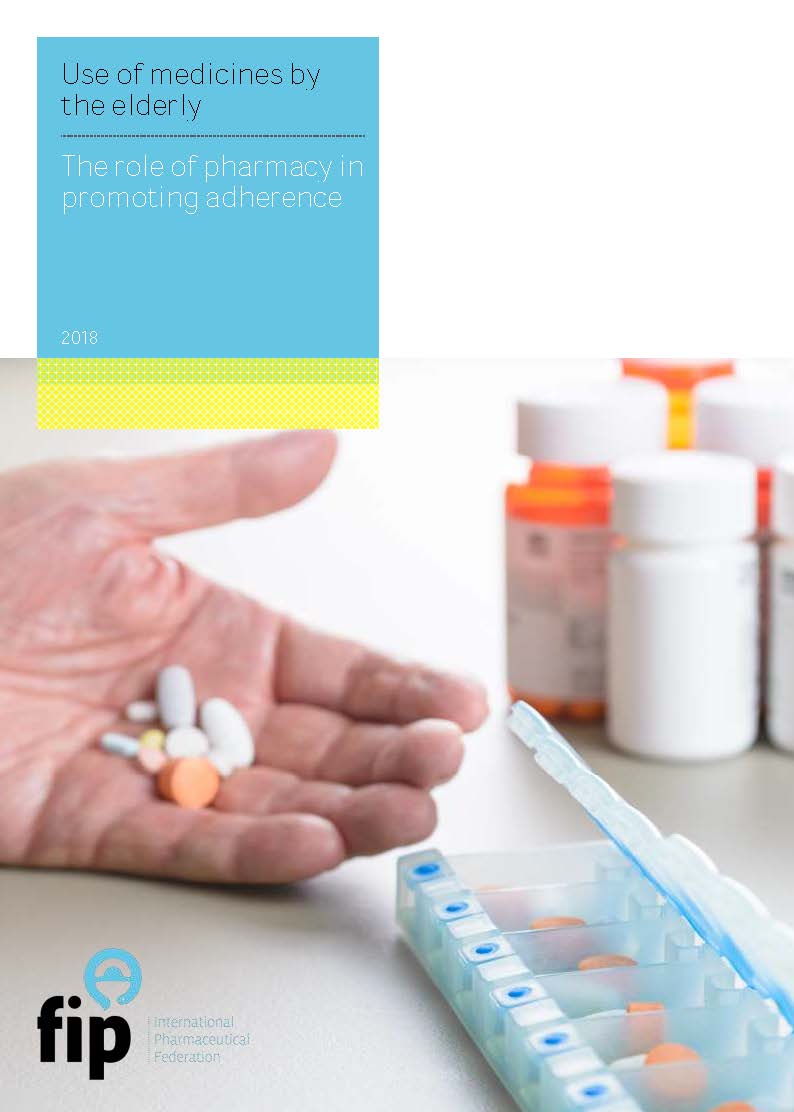
How pharmacists can improve adherence in the elderly (2018)
Article published on the International Pharmacy Journal.

